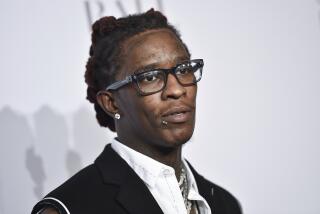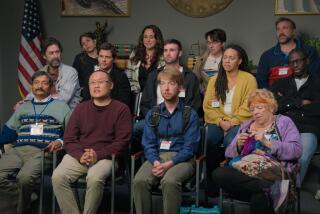Partition Will Shield McVeigh Trial Jurors
- Share via
DENVER — The men and women selected to decide Timothy J. McVeigh’s guilt or innocence will sit behind a permanent partition intended to shield them from all reporters and most spectators in the federal courtroom.
The 6-inch-thick wall, covered in beige fabric and slightly curved toward the judge’s bench, slants from a height of 10 feet, where it is attached to the left courtroom wall, to about 3 feet near the front of the jury box.
It is an extraordinary effort to guard the privacy of the 12 jurors and six alternates in McVeigh’s trial on charges he planted the bomb that blew up the Oklahoma City federal building, killing 168 people.
McVeigh, 28, faces the death penalty if convicted on murder, conspiracy and weapon charges.
In other high-profile trials, witnesses are sometimes screened from view, and jurors’ identities are frequently protected, but judicial observers say this may be the first time a wall has been erected to hide jurors. “No one here is familiar with that practice being used in federal court,” said David Sellers, an Administrator of U.S. Courts spokesman in Washington.
“This is obviously a case where you need to be concerned about the jurors,” said Frank Jamison, a former county judge in Colorado. “There are nuts out there who will try to get them for one reason or another, either for influence or to harm them.”
The diagonal wall blocks the view of the jury box from about 75% of the spectator seats as well as those watching the closed-circuit TV feed of the trial.
Reporters and sketch artists are required to sit in the seats to the left of the center aisle. That puts them on the same side of the courtroom as the jury box, where the wall is highest.
Spectators in the first few rows of the right-hand section and as far right as possible will be able to see a few jurors, but the only clear view is from the judge’s bench and the attorneys’ tables.
In addition to erecting the new wall in his courtroom, U.S. District Judge Richard P. Matsch is withholding names of prospective jurors and hearing some legal challenges behind closed doors.
The jury selection continued Friday. A prospective juror who once served on a panel that sentenced a man to death said she believes that McVeigh is guilty. She had said Thursday she does not want to serve in another death penalty case.
More to Read
Sign up for Essential California
The most important California stories and recommendations in your inbox every morning.
You may occasionally receive promotional content from the Los Angeles Times.












